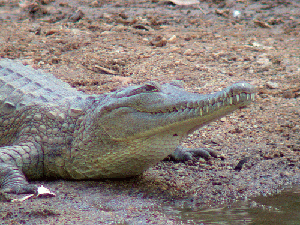Freshwater crocodiles (Crocodylus johnsoni or Crocodylus johnstoni), also known as the Australian freshwater crocodile, Johnston's crocodile or colloquially as freshie, is a species of reptile endemic to northern Australia.
Unlike the much larger relative to their Australian saltwater crocodiles, freshwater crocodiles are not known as man-eaters and rarely causes casualties, although they will bite in self-defense if cornered.
Freshwater crocodiles are relatively small crocodile. Males can grow up to 2.3 to 3 m (7.5 to 9.8 ft) long, while females reach a maximum size of 2.1 m (6.9 ft). Men are usually weighs about 70 kg (150 lb), with large specimens up to 100 kg (220 lb) or more, on a woman's weight of 40 kg (88 lb). In areas such as Lake Argyle and Katherine Gorge there are several certified 4 meters (13 feet) of individuals. This type of nozzle shy and have more lean than saltwater crocodiles are dangerous. Brown body color with dark tape on the body and tail - these tend damaged near the neck. Some individuals have different bands or spots on the nose. Body scales relatively large, with a wide, strong armored plate on the back. Rounded, rocky scales cover the hips and outsides of the feet.
Eggs are laid in holes during the dry season Australia (usually in August) and hatched at the beginning of the rainy season (November / December). Crocodiles defend their nest during incubation. From one to five days before hatching, the young people started calling from inside the egg. This induces and synchronize hatch on siblings and stimulate adults to open the hive. It is not known whether adults were granted open nest egg laying female. As a young boy emerged from the nest, adults take them one by one at the end of his mouth and carry them to the water. Adults can also help in solving the young through the egg shell with chewing or manipulate eggs in their mouths.
Freshwater crocodiles found in the state of Western Australia, Queensland and the Northern Territory. Main habitats include freshwater wetlands, billabongs, rivers and streams. They compete poorly with saltwater crocodiles, but this species is tolerant of salt water. Adult crocodiles eat birds, bats, reptiles, amphibians and fish, although larger individuals may take prey as large as a wallaby. This species can live in areas where saltwater crocodiles can not, and is known to inhabit the region on the slopes of Kakadu National Park and in a very dry and rocky (as Katherine Gorge, where they are common and relatively safe from saltwater crocodile during dry season). However, they still consistently found in the lower level billabongs, living alongside the saltwater crocodile near the tidal river.
Until recently, freshwater crocodiles are common in northern Australia, especially where saltwater crocodiles are not present (such as the drier inland areas and higher elevation). In recent years, the population has dropped drastically due to the use of the invasive Cane Toad. Frog is poison for freshwater crocodiles, although not for saltwater crocodiles, and frogs that predominated throughout the wilderness of Australia. Crocodiles are also affected by Griphobilharzia amoena, a parasite trematoda, in areas such as Darwin.

No comments:
Post a Comment